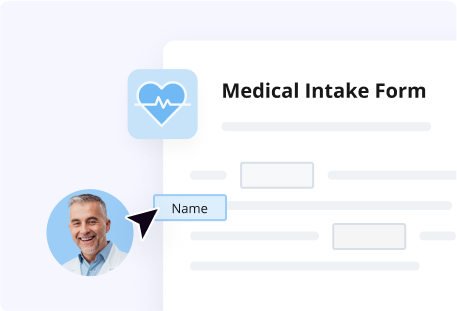Type any topic that interests you
Unlock the ins and outs of automating electronic patient intake questions form for covid-19 with online course

About this course
After finishing this program, you’ll be able to take your practice to another level by reducing your time wasted to unproductive manual data collection, boosting the experiences of your patients, and minimizing risks of data breaches and non-compliance with HIPAA regulations.
What’s included in the online course:
- Comprehensive classes covering the important aspects of building a Flow for covid-19 an enhanced patient intake process.
- A handy online test that enables you to refresh and solidify your newly acquired information on electronic patient intake Unlock the ins and outs of automating electronic patient intake questions form for covid-19 with online course automation.
- A badge certifying your new skills and expertise in patient intake automation.
What will you get?
- An in-depth walkthrough of steps to create your Flow from A to Z with our online course.
- The best practices of setting up your electronic patient intake Unlock the ins and outs of automating electronic patient intake questions form for covid-19 with online course for covid-19 flow.
- A guide on how to integrate with some available solutions and systems of record.
- Insightful tips and tricks for operating your Flow more efficiently.
Who can enroll in this online course?
- Doctors, nurse practitioners, and medical professionals trying to increase the quality of covid-19 care they offer.
- Front office staff treating administrative matters and patient data changes, including the handling of electronic patient intake Unlock the ins and outs of automating electronic patient intake questions form for covid-19 with online course.
- Managers managing the IT aspect of healthcare activities and communications with patients.
More courses you might like
What our students say
Start learning today
Sign now for free
Questions & answers
The airSlate Academy offers an array of free online course options. And our program on electronic patient intake questions form Flow for covid-19 is one of them. To see a full rundown of courses, visit airSlate Academy’s main page. Please remember that you can take as many courses as you want.
Mishandling patient data during registration can lead to poor customer experience, erroneous information entry, and, most importantly, legal issues for healthcare services. airSlate complies with HIPAA standards created for protecting patient data at all stages of interaction. Automation of electronic patient intake questions form workflow for covid-19 with airSlate can help dodge these problems by digitizing patient intake processes, automating routine tasks, and enhancing document security by storing patient data electronically.
Common bottlenecks of the electronic patient intake process include manual data entry in questions form, long wait times, and the risks of losing or misplacing patient documents. Automation will let handle these issues by digitizing patient intake processes, automating routine tasks including submitting personal information and medical history forms for covid-19 care, and storing patient data online, which can improve precision, minimize waiting time, and improve document encryption.
This type of software refers to apps developed to enhance and automate patient information collection and handling. Such electronic patient intake program usually comes with tools like dynamic Unlock the ins and outs of automating electronic patient intake questions form for covid-19 with online course, secure data storage, and integration with other healthcare tech stack. If you want more information on how it works, discover the online course options that airSlate Academy gives.
We created our course for everyone involved in covid-19 care who is searching for ways to streamline the patient admission experience through the use of contemporary technologies. This group is represented by medical professionals with an array of task: from physicians and nurse practitioners to front-office admins and receptionists. Also, our electronic patient intake questions form program will be great for IT professionals searching for automated ways to design and integrate efficient and safe systems for gathering and dealing with patient data.
The objective of electronic patient intake questions form is to request and handle essential information, generally at the first point of interaction with a patient. This data typically includes demographic data, medical history, insurance details, and other information that can help healthcare workers make certain that the patients get exceptional care. By collecting this information, medical care companies can streamline the care process and make sure patients receive the best possible care.











